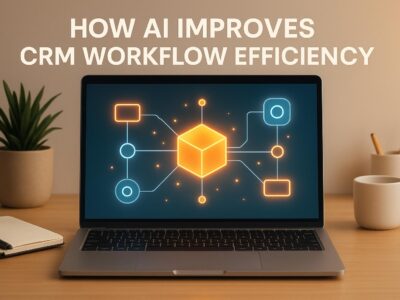AI Sales Enablement is changing how businesses plan their market strategies. By using artificial intelligence in sales, companies can improve their performance and how they engage with customers. They can automate everyday tasks and use data to make better sales plans. This leads to better results.
McKinsey & Company found that using AI can increase revenue by 3 to 15%. The return on investment in sales can also improve by 10 to 20%. This article will look into what AI Sales Enablement is, its main features, and the benefits it brings to sales teams. We’ll also talk about how to use AI in sales, share success stories, and discuss future trends. For more about AI Sales Enablement, read here.
Key Takeaways
- AI Sales Enablement revolutionizes GTM strategies.
- Artificial intelligence for sales enhances performance and engagement.
- Automation of tasks frees up time for sales professionals.
- Significant revenue uplifts can be achieved through AI investment.
- Data-driven insights create more effective sales strategies.
- Case studies provide real-world evidence of AI benefits.
Understanding AI Sales Enablement
AI Sales Enablement combines artificial intelligence with sales strategies. Its goal is to make sales teams more efficient and effective. By using high-tech tools, businesses can make their operations smoother, handle everyday tasks automatically, and deeply understand their customers and the market.
What is AI Sales Enablement?
Basically, AI Sales Enablement means using AI to help sales people work better. This method improves sales activities and boosts team productivity. With a platform powered by AI, companies give their teams the best tools, information, and data to connect with customers well.
Key Features of AI Tools
The power of AI tools in sales enablement is a big deal. These tools offer:
- Email outreach automation using smart language models for better communication.
- Predictive analytics for knowing which leads and customer insights are most valuable.
- Personalized training programs designed for each sales rep’s needs.
These features greatly improve the sales enablement platform, helping teams work better and achieve more.
Importance for Sales Teams
AI Sales Enablement has a big impact on sales teams. It leads to better customer interaction, thanks to data insights. This helps build stronger customer connections. Salespeople can spend more time on important sales tactics instead of paperwork. Plus, AI gives real-time data analytics, helping teams make smart decisions that follow market and customer trends.

The Benefits of AI in Sales Enablement
AI in sales brings big benefits, improving decision-making and how work gets done. With the help of AI, sales teams get better at planning and talking to customers because of insights from lots of data. This part will look at how smart analytics, engaging with customers, and making work smoother can uplift sales teams.
Enhanced Data Analytics for Decision-Making
AI sales tools give up-to-the-minute data analysis, letting leaders choose wisely. Predictive analytics helps see important info like deal sizes, win rates, and how happy customers are. Companies can use this insight to tweak plans and get better results.
Improved Customer Engagement Techniques
AI makes connecting with customers more personal, matching their likes. Tools for sales automation study customer habits, so teams can share the right content. This approach really boosts engagement and chances to make a sale, building stronger bonds.
Streamlining Sales Processes
AI tools take over boring tasks, freeing up salespeople to do more meaningful work. By making sales steps smoother, teams can be more effective, which leads to doing more business and better sales. Using these tools is key to staying ahead in the market today.

Using these cutting-edge solutions can really make your sales soar, leading to success and growth.
Implementing AI Sales Enablement Solutions
Getting AI sales enablement solutions to work well means having a clear plan that matches your company’s goals. Starting out requires checking your business goals and finding where AI can really make things better. It’s important each tool works with your CRM, ensuring everything runs smoothly across all platforms. Picking the right sales software is crucial for this, as it allows teams to use data to make smart decisions.
Steps for Integration into Your Sales Strategy
To improve your AI sales strategy, here are some important steps:
- Look at your current sales methods and figure out what’s not working.
- Find and choose AI tools that meet your specific needs.
- Make sure they fit seamlessly with your CRM.
- Create a clear plan for putting these tools into action, including timelines and what you hope to achieve.
Training and Adoption for Sales Teams
Taking on new tools means your sales teams need good training. Here’s what to do:
- Run workshops so teams know what the software can do.
- Teach them the best ways to use AI tools.
- Encourage everyone to work together and support each other in using new technology.
Overcoming Common Implementation Challenges
Introducing AI tools can bring up a few hurdles such as:
- Staff being wary of new changes.
- Poor quality data messing with AI’s effectiveness.
- A lack of knowledge about how AI tools can benefit sales.
Dealing with these issues from the start with clear talks and good data handling will make moving to a data-oriented sales approach smoother.
Case Studies of Successful AI Implementation
Looking into sales enablement case studies shows the real benefits of AI in different industries. Many leading groups have brought AI into their sales routines, leading to big improvements. These examples show how they used AI to boost their sales numbers in a big way.
Real-World Examples of AI Impact
Takeda Oncology combined patient data with treatment options, giving sales teams up-to-date info. This made their sales approaches better and more informed. Their sales teams engaged more effectively with customers.
ACI Corporation saw higher sales and more qualified leads with Salesken’s real-time help. Their sales conversion rose from under 5% to 6.5%. Their qualified leads jumped from 45.5% to 64.1%, showing AI’s power in lead management.
Druva used Synthesia’s AI video for quicker sales training. They cut down training content time from two hours to under 30 minutes. This let their team learn important info faster, without waiting.
Capgemini got a 40% increase in sales-ready results with Aptivio’s AI platform. They also saw a 4.8 times increase in marketing-qualified leads. This shows the amazing results of matching AI with business plans.
Rogers Communication used the AI SalesChoice Insight Engine for better proposal checks. They were 80% accurate in sales forecasts. This helped them make smarter choices during the sales process.
Lessons Learned from Industry Leaders
These success stories teach us valuable lessons. Matching AI tools with sales strategies is crucial. And, making sure sales teams are well-trained on AI tools helps increase productivity and sales.
Metrics for Evaluating Success
Important metrics like conversion rates, sales cycle times, and deal sizes help measure success. Companies can tweak their strategies with these key numbers. This helps them keep improving.
For deeper insights, check out these detailed case studies about AI’s role in changing sales processes.
Future Trends in AI Sales Enablement
Artificial intelligence technologies are advancing quickly, changing how sales work. More and more, companies are using AI, especially with machine learning, to help their sales teams. This means salespeople can use insights from data to come up with better strategies.
Predictions for AI in Sales
AI will focus a lot on making things more personal in the sales world. AI tools will help understand what customers want and how they act. This means sales teams can adjust how they talk to people, which will make customers more interested and likely to buy. AI is becoming very important in selling today.
Innovations on the Horizon
We’re going to see new tools like conversational AI. These technologies will make talking to customers better and faster. They’ll help businesses lead the way in how sales are done. By using AI every day, sales teams won’t have to spend as much time on paperwork. Instead, they can focus on making strong connections with people.
Preparing for the Evolving Sales Landscape
Businesses need to get ready for a lot of changes. It’s very important to teach sales people about AI. This will help them keep up with changes and stay ahead in a market that’s all about AI. By being flexible and ready to adapt, companies will do well now and in the future of sales.
FAQ
What is AI Sales Enablement?
AI Sales Enablement uses artificial intelligence to make sales better and more efficient. It helps with routine tasks and gives insights based on data. This lets sales teams focus more on selling and talking to customers.
What are the key features of AI tools?
AI tools offer features like automating emails, predicting which leads will buy, customizing training, and analyzing data deeply. These help salespeople do better by offering smart insights and making their jobs easier.
How does AI improve customer engagement?
AI makes customer interactions more personal by learning what customers like. This means communications are more engaging and effective. As a result, customers are happier and more likely to buy.
What are the steps to implement AI Sales Enablement solutions?
To start using AI, first check your business goals to see where AI fits. Then, pick the right AI tools that work well with your CRM system. Finally, make sure your sales team knows how to use the new tech properly.
What common challenges can arise during implementation?
Some troubles you might run into include people not wanting to change, bad data, and issues getting AI to work with your current systems. To avoid these, talk about the perks of AI, manage your data right, and support your team as they learn.
Can you provide examples of successful AI implementation in sales?
Big companies that use AI in their sales see good results. They report better efficiency and sales numbers. Measures like how many deals are made, how fast, and their value show AI’s big impact.
What future trends are expected in AI Sales Enablement?
The future looks like more companies will use AI, with new developments in chat AI and learning machines. There will also be a bigger focus on making sales experiences very personal and aimed at what customers really want.
How can businesses prepare for the evolving sales landscape with AI?
Companies should always be ready to adapt, teach their sales teams about AI, and update their sales methods. This will help them stay ahead in a world where AI is becoming a big part of sales.



